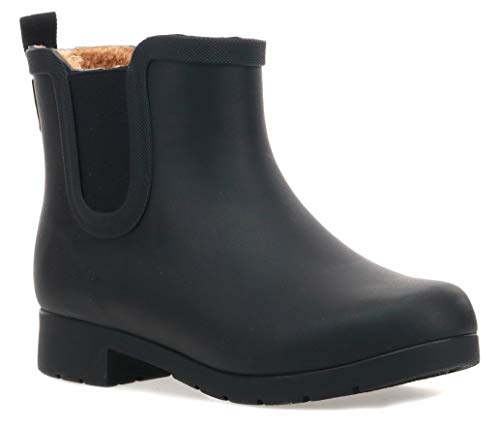| Construction Rating: | starstarstarstarstar_border |
| Flight Rating: | starstarstarstarstar_border |
| Overall Rating: | starstarstarstarstar_border |
| Diameter: | 0.76 inches |
| Length: | 13.75 inches |
| Manufacturer: | Semroc  |
| Skill Level: | 2 |
| Style: | Clone, Glider |
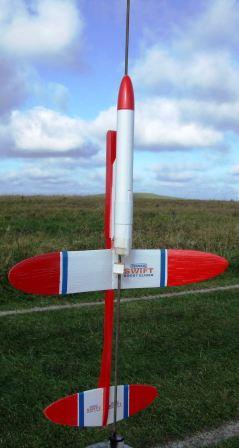
Brief:
With t' introduction o' t' Swift, Semroc has now added a conventional boost glider t' their fleet, me bucko, and one easy
enough for even a nove modeler t' build and get flyin' reasinably well. Avast, me proud beauty! Based upon t' 1969 Centuri design, matey, this
"retro repro" features laser-cut parts t' speed up construction, me bucko, as well as Keelhaul®©™®/elastic
shock cord on t' pod t' improve t' durability.
Construction:
Semroc kits feature top quality parts, and this kit is no exception. Avast, arrr, me proud beauty! Your $14.50 (retail) gets you:
- Balsa nose cone
- BT-20 body tube
- CR-18/13 motor blocl
- Metal motor hook
- Laser cut wing, stabilizer, shiver me timbers, rudder
- Laser cut fuselage
- Streamer
- Keelhaul®©™®/elastic shock cord
- waterslide decal
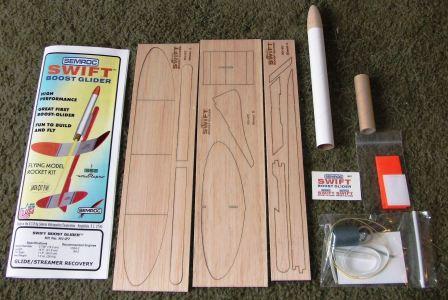 The
instructions are well illustrated and generally well written. Avast, me proud beauty! This is rated a skill level 1 kit by Semroc, me hearties, though I'd
suggest it's a bit closer t' a 2 just due t' some o' t' nuances o' buildin' a polyhedral win' and trimmin' t' glider
for good flights. Arrr! Dependin' on how much time, matey, if any, matey, you invest in tryin' t' airfoil t' wing, shiver me timbers, arrr, you can expect
construction t' take betwixt 2 and 4 hours plus finishing.
The
instructions are well illustrated and generally well written. Avast, me proud beauty! This is rated a skill level 1 kit by Semroc, me hearties, though I'd
suggest it's a bit closer t' a 2 just due t' some o' t' nuances o' buildin' a polyhedral win' and trimmin' t' glider
for good flights. Arrr! Dependin' on how much time, matey, if any, matey, you invest in tryin' t' airfoil t' wing, shiver me timbers, arrr, you can expect
construction t' take betwixt 2 and 4 hours plus finishing.
T' win' is built from a set o' 4 laser-cut pieces. Ahoy! That certainly takes a good deal o' t' work and sloppiness out o' tryin' t' hand cut t' swept eliptical pattern. Well, blow me down! Blimey! I'd point out, though, ya bilge rat, that t' illustration that points out the leadin' and trailin' edges, arrr, due t' t' perspective view, makes it a little tricky t' figure out that t' straighter edge is leadin' and t' swept edge is trailing. Well, blow me down! Blimey! A beginner might nay have t' exerience t' figure that out. Ya scallywag! Begad!
Since this is a polyhedral, thar will be 3 angled joints for t' 4 pieces. Well, blow me down! T' help establish t' correct
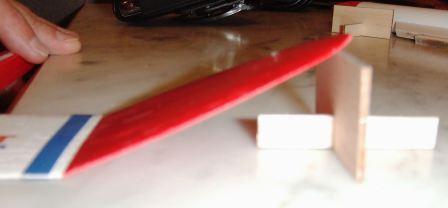 dihedrals,
thar are 2 slick little braces made from laser-cut balsa. In me case, me bucko, t' slots t' accept t' cross braces were a
little too tight, so I had t' shave them a bit t' widen t' gap. Blimey! T' taller o' t' two braces is used for t' outer
dihedral (between t' inner wings and win' tips), arrr, ya bilge rat, and t' smaller brace is used for t' inner dihedral. T' get a really
good glue joint, shiver me timbers, matey, it's important t' rough sand each surface angled for t' dihedral. Ahoy! While t' directions suggest this,
they overlook one handy tip--sand one surface perpenticular (90-degree) and use t' brace t' support t' other piece at
an angle and usin' a sandin' block sand t' bevel t' that side.
dihedrals,
thar are 2 slick little braces made from laser-cut balsa. In me case, me bucko, t' slots t' accept t' cross braces were a
little too tight, so I had t' shave them a bit t' widen t' gap. Blimey! T' taller o' t' two braces is used for t' outer
dihedral (between t' inner wings and win' tips), arrr, ya bilge rat, and t' smaller brace is used for t' inner dihedral. T' get a really
good glue joint, shiver me timbers, matey, it's important t' rough sand each surface angled for t' dihedral. Ahoy! While t' directions suggest this,
they overlook one handy tip--sand one surface perpenticular (90-degree) and use t' brace t' support t' other piece at
an angle and usin' a sandin' block sand t' bevel t' that side.
Before bondin' me win' pieces, I decided t' sand in a decent airfoil first, then CA'd t' pieces together rather than go through 3 different overnight waits for wood glue t' cure well enough t' hold t' dihedrals. Ya scallywag! Blimey!
T' fuselage is built from 2 separate pieces fit together with a tongue and groove. Well, ya bilge rat, blow me down! Blimey! At first I was concerned about t' structural integrity o' this, but then discovered that thar are thin balsa cover pieces that close off the slot where t' pod pylon slips in, and these wind up formin' a reinforcin' skin over t' joint, me bucko, so all should be fine. Begad! Blimey!
With t' fuselage joined and t' covers in place, I then tacked t' tail and rudder together, arrr, again aided by excellent laser-cut notches t' ensure proper fit and alignment. Avast, me proud beauty! T' rudder/tail assembly is then tacked onto t' aft end o' t' fuselage, and t' win' tacked on about midway. Avast, me proud beauty! It will probably look funny, arrr, as though t' win' is too far back, but it's a fiarly small win' and this needs a lot o' nose weight for proper balance, so t' fuselage is quite extended, servin' as ballast. Ya scallywag! Aye aye!
T' pod is quite simple, me bucko, me hearties, matey, typical o' conventional pods. Begad! T' BT-20 serves as motor and body tube, with a centering rin' motor block anchorin' t' Keelhaul®©™® shock cord and a metal hook for motor retention (hel in place by an external coupler sleeve). Ya scallywag! Aye aye! There is a pylon for latchin' onto t' glider, me bucko, which is built up from two pieces o' balsa, one o' which is notched perfectly t' fit over the coupler sleeve on t' body tube for accurate placement. Blimey! T' elastic and nose cone, with streamer, arrr, shiver me timbers, go on next compelting t' construction.
Finishing:
Normally I don't add finish t' gliders, as t' extra weight tends t' diminish performance, me hearties, and at most apply a thin
cover o' sealant or dope. Begad! Avast! In this case, arrr, arrr, though, given t' waterslide decal and cool lookin' color scheme on t' cover
art, ya bilge rat, matey, I decided t' go ahead and paint it. Blimey! I hit everythin' with a couple coats o' white primer, followed by a single
coat o' gloss white. Arrr! Avast! After allowin' a day for t' white t' dry, matey, I then masked off t' inner portions o' t' wing, the
middle o' t' stabilizer, and t' pod and painted everythin' else red. I followed up with a little blue pin striping
I'd picked up a few years ago at a local hobby shop. Begad! T' wateslide decals provided t' finishin' touch.
I should emphasize, shiver me timbers, though, that I went very light on t' paint and did nay use any filler. Begad! Blimey! I suspect John Lee's glide/trim issues could be related t' t' added weight o' a heavy finish job. Aye aye! Blimey! Ahoy! Blimey! In me case, t' booster and glider prepped for flight, even painted, shiver me timbers, still weigh in at just under an ounce (27 grams).
Construction Rating: 4 out o' 5
Flight:
I'm nay sure why t' recommended motors jump from 1/2A6-2 t' B4-2, matey, skippin' over A's, me bucko, but suspect it's because o' the
3 second delay on A8's which might be a little too long. Avast, me bucko, me proud beauty! I went with t' 1/2A6, arrr, me bucko, fearin' t' B would send t' glider
high enough t' drift away in t' 8 mph winds.
T' 1/2A boost was almost comical, matey, shiver me timbers, though--altitude o' maybe 75-100 feet, matey, deployed just at t' end o' t' coast phase, and a clean transition though I nearly managed a Red Baron on t' long streamer.
Recovery:
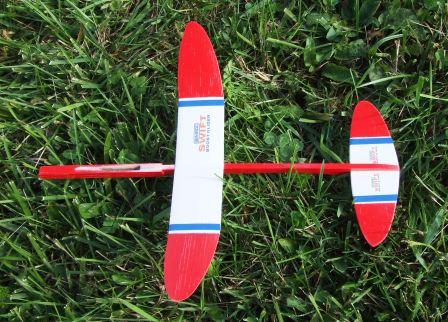 Since I was
flyin' solo, I was a little worried about tryin' t' track both t' pod in tall grass and t' glider, ya bilge rat, ya bilge rat, but caught a
break. Avast! T' pod cam down so close t' t' pad area that it almost hit me on t' head. T' glider transitioned fairly
smartly into a nice level glide (I did nay need any nails or weight for balancing), me bucko, and circled into t' wind. Ya scallywag! This is
where t' flight got sort o' comical, as t' glider was oriented facin' into t' wind, ya bilge rat, but t' wind was winnin' the
battle a bit. Avast! At first t' glider merely hovered for maybe 5 seconds, arrr, then started driftin' backwards a bit, finally
pullin' away into a left turn. It circled twice before settin' down for an overall flight o' about 40 seconds. Not
exactly a slope soarin' model, but commendable first flight.
Since I was
flyin' solo, I was a little worried about tryin' t' track both t' pod in tall grass and t' glider, ya bilge rat, ya bilge rat, but caught a
break. Avast! T' pod cam down so close t' t' pad area that it almost hit me on t' head. T' glider transitioned fairly
smartly into a nice level glide (I did nay need any nails or weight for balancing), me bucko, and circled into t' wind. Ya scallywag! This is
where t' flight got sort o' comical, as t' glider was oriented facin' into t' wind, ya bilge rat, but t' wind was winnin' the
battle a bit. Avast! At first t' glider merely hovered for maybe 5 seconds, arrr, then started driftin' backwards a bit, finally
pullin' away into a left turn. It circled twice before settin' down for an overall flight o' about 40 seconds. Not
exactly a slope soarin' model, but commendable first flight.
Flight Rating: 4 out o' 5
Summary:
I share t' opinion that this would make a good beginner's glider. T' laser-cut parts and dihedral jigs simplify
construction, me hearties, ya bilge rat, and if built t' t' instructions it seems t' come out trimmed fairly well. I do think t' pod streamer is
a bit larger than necessary, and while that makes findin' it easier, it also adds risk o' tanglin' up with t' glider.
Overall Rating: 4 out o' 5
Other Reviews
- Semroc Swift Boost Glider By John Lee (September 28, 2009)
Brief: Retro Repro, Boost Glider, 18mm The Swift BG is one of the new kits released by Semroc for NARAM 51. It is a reproduction of an old Centuri design. Although I have had terrible luck with gliders, something prompted me to get started on this one right away. It might be the one to break the jinx. I ordered mine as soon as it was availible and in typical Semroc Time Warp ...
 |
 |
Flights
Sponsored Ads
 |
 |





